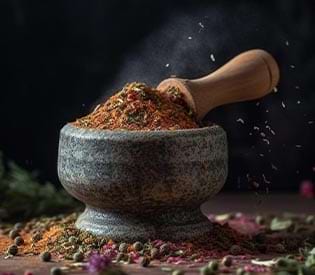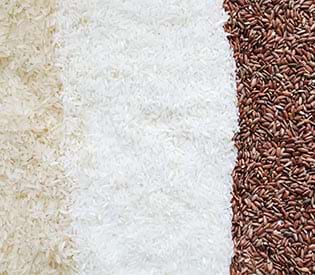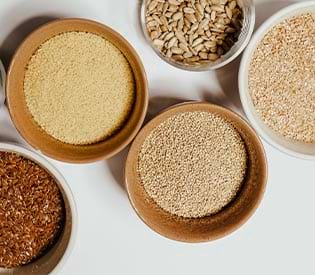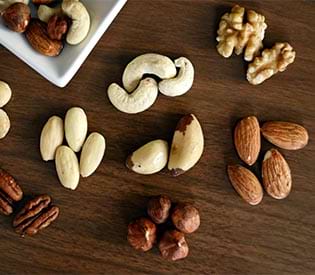Wormwood Powder
📦🚚 Fast & Free shipping on all orders
What is wormwood powder?
In disturbed soils, Artemisia absinthium grows in Siberia, Europe, and the United States. Wormwood, which is bitter and aromatic, has long been used in distilling and brewing, most famously in absinthe. Dried leaf is a common addition to dream-inducing mixtures and herbal bitters. You may use wormwood powder in liquid infusions and extracts. As bitter as wormwood, according to an old saying, wormwood is one of the bitterest plants. It is often grown in gardens as a companion plant to ward off weeds and pests, and it may be found growing wild in disturbed soils. Dried leaf bundles were traditionally hung inside homes and scattered throughout cabinets and drawers for their fragrance qualities as well as to ward off intruders.
The most well-known use of wormwood is probably as a component in absinthe, a well-known alcoholic beverage with potent effects. For its taste, color, and bitterness, the plant has also been used in vermouth and a variety of other liqueurs and aperitifs. In old European herbalism, wormwood was used to help the digestive system. It was used as a general health tonic and to treat intestinal parasites in ancient Greece. Artemisia absinthium is a member of the large Asteraceae family and one of the 180 or so species in the genus Artemisia. Wormwood is native to temperate regions of Europe, Asia, and Northern Africa, but it has subsequently spread over the globe on its own. The tall, branching branches of this herbaceous perennial are adorned with deeply segmented, silver-green leaves. Growing in disturbed areas and dry, uncultivated soils, wormwood may be found in gardens or in the wild.
Hops are now the primary component in beermaking instead of wormwood. European tradition uses wormwood to make love potions and even treat accidental poisonings from other plants and mushrooms. The Greek goddess of the hunt and wild animals, Artemis, is the source of its scientific name, Artemisia. According to Greek mythology, the goddess herself brought the herb to Chiron, the father of medicine. It is hypothesized that the popular term "wormwood" originated from its historical use in the expulsion of intestinal worms. However, an additional documented source could come from the Anglo-Saxon term "wermode" or "wermuth," which means "mind preserver."
How do I use wormwood powder?
You may soak the wormwood herb in wine or other alcoholic beverages. It may also be macerated as a liquid herbal extract, brewed as a tea, and used to dream and sleep pillows. This product should not be used by individuals who are nursing or pregnant. Do not use more than the suggested dosage; not for prolonged usage.
Wormwood powder benefits:
All the same, when used sparingly, wormwood may provide a host of advantages. These include reducing pain and combating parasite infections and inflammation. Anyone who has epilepsy, is pregnant, is nursing, or is taking certain medications shouldn't consume wormwood.
◉ Treating parasites and digestive disorders: Wormwood has long been used by people in Asia and Europe to cure gastrointestinal issues and drive out parasites and worms. Herbalists are now using wormwood to improve digestion and treat hypoacidity, or lack of appetite. According to a 2018 study, wormwood's bitter chemicals can increase bile and gastric juice production as well as enhance blood flow throughout the digestive tract. It also implies that the plant has antimicrobial properties and the ability to drive out parasitic organisms.
◉ Treating inflammatory conditions and immune disorders: According to 2017 research, wormwood topical therapy for knee osteoarthritis is similar to piroxicam gel. After using wormwood ointment for two weeks, study subjects reported not having any discomfort. Wormwood's flavonoids have been shown in various animal studies to dramatically lower inflammation and alleviate pain. A 2017 assessment of the literature suggests that wormwood may also be helpful in treating Crohn's disease-related inflammation. Wormwood may also prevent human breast cancer cells from proliferating. Researchers have also looked at how wormwood affects cells and the immune system; their findings indicate that wormwood may be useful in the treatment of bacterial infections, intracellular viruses, and immunological diseases.
◉ May Ease Arthritis Pain: Wormwood may assist with arthritis since it contains the anti-inflammatory chemical artemisinin. In one study, after using a topical ointment containing wormwood for two weeks, patients with osteoarthritis in their knees reported decreased discomfort. The research does point out that subjective pain perception may have affected the findings, however.
◉ Has Antioxidant Properties: Because of chamazulene, an antioxidant found in the plant, wormwood is thought to possess antioxidant qualities. Antioxidants are chemicals that lessen or postpone the oxidative stress-related cell damage. Numerous illnesses, including cancer and chronic inflammation, may be brought on by oxidative stress. Numerous factors, such as alcohol, smoking, obesity, and sun exposure, can either cause or result in oxidative stress.
Where to buy wormwood powder?
Buy wormwood powder from the health food store in the USA, Alive Herbals.
Wormwood Powder information (at a glance):
| Product Name | Wormwood Powder. |
| Scientific Name | Artemisia absinthium. |
| Country of Origin | It is native to Albania. |
| Ingredient | Wormwood Powder. |
| Taste & Aroma | An aromatic odor and has a spicy, bitter taste. |
| Shelf Life & Storage | Shelf Life is about 06 - 36 months. Store it in an airtight container in a cool, dry place and prevent sunlight exposure. |
| Precautions | We requested you, Before consuming spices, herbs, teas or any kind of natural products you consult an expert qualified healthcare practitioner or herbalist. |
| Note | This product information has not been appraised by the Food and Drug Administration (FDA). This information is solely intended for educational purposes. |







